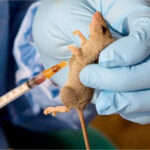Scientists have launched a trial to deliberately infect people with coronavirus after they have already had it.
The study will help establish the level of immune protection which stops people from being reinfected, which could help to fast-track future vaccines.
- We are not harbouring criminals, Northern community in Abia
- Minister Pantami’s case and the ‘War on Terror Witchhunt’ in Nigeria
The trial, which is led by the University of Oxford, will expose every volunteer to the virus so that only those with a strong enough immune response will avoid being reinfected.
Researchers will hope to ascertain what level of immune response protects people.
That could mean vaccines that produce that golden level of immunity could be fast-tracked and licensed without trials of tens of thousands of people being necessary.
Study lead and Professor of vaccinology, Helen McShane said: ‘If we can determine… that a certain level of antibodies means it’s not possible to reinfect somebody, that would feed very immediately into designing the most effective vaccines.’
The study, which is funded by the Wellcome Trust and is expected to start this month after receiving ethics approval, will recruit people aged 18-30 who have previously been naturally infected with COVID.
They will be re-exposed to the virus in a safe and controlled environment while a team of researchers monitor their health.
Human challenge studies have played a key role in furthering the development of treatments for diseases such as malaria, TB, typhoid, cholera and flu.
A similar study is ongoing in the UK where volunteers are being infected with COVID-19 to test vaccines and treatments.
Healthy volunteers are paid £4,500 to get infected with the virus, with scientists keeping them under 24-hour surveillance until they recover.
Participants are administered a tiny dose of COVID via a nasal spray and then asked to lie flat on their backs for 30 minutes to allow it to seep into their respiratory system.
They are then quarantined at the Royal Free Hospital, London, for about two weeks or until they recover from the infection. They then have follow-up appointments every few weeks for a year.
The first volunteers were infected in early March, and have now been discharged following no ill effects.
While COVID infections have been rare, recent research suggests prior infection may not fully protect young people against reinfection.
The observational study, published in the Lancet involving US Marine Corps members mostly aged 18-20, showed that between May and November 2020, around 10 per cent of participants who had previously caught COVID became re-infected.
The Oxford study will take phase in two phases.
The first phase, involving 64 healthy volunteers, will aim to establish the lowest dose of virus which can take hold and start replicating.
Once the dosing amount is established, it will be used to infect participants in the second phase of the study, which is expected to start in the summer.
Professor McShane said: ‘We will measure the immune response at several time points after infection so we can understand what immune response is generated by the virus.
‘A challenge study allows us to make these measurements very precisely because we know exactly when someone is infected.
‘The information from this work will allow us to design better vaccines and treatments, and also to understand if people are protected after having COVID, and for how long.’
The participants will be quarantined for 17 days under and cared for by the research team at a hospital until they are no longer at risk of infecting others.
Those who develop symptoms will be given a monoclonal antibody treatment developed by Regeneron, which contains laboratory-made antibodies that have shown to reduce the risk of disease progression in clinical trials.
The full length of the study will be 12 months, which will include eight follow-up appointments after discharge.
Professor McShane said those taking part will be reimbursed for their efforts, which will be just under £5,000 for each participant.
– Mail Online

 Join Daily Trust WhatsApp Community For Quick Access To News and Happenings Around You.
Join Daily Trust WhatsApp Community For Quick Access To News and Happenings Around You.


